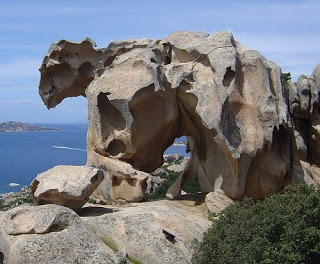| Home » Articles » LESSON NOTES (Social Studies) » High School level |
weathering
WEATHERING
 Def:
Weathering is the process of weathering, disintegration or fragmentation of rocks into small particles.
Rocks on the earth’s surface are weathered by different type where we get type of weathering as follows:
1. PHYSICAL / MECHANICAL WEATHERING This is type of weathering whereby the rocks disintegrate in small particles without chemical reaction.
Physical weathering occurs in different type such as:
A. temperature change (exfoliation)
This is the type of physical weathering where by temperature cause the rocks to disintegrate, when temperature increase rocks expand during the day and when temperature falls during the night rocks decrease in size so this process when continues every day cause the rocks to break into pieces, the broken rocks are know as exfoliation
B. frost action
This is the type of physical weathering of the rocks caused by frost, when water penetrates in fissures of the rocks and when temperature cools and falls below 0˚c it causes water to freez in fissures, since freezing water/ice has high volume than melting water then cause expansion of rocks and development of cracks then fragmentation of rocks.
C. alternate wet and dry
Rocks are combination of different minerals, all minerals absorb and loss water in different rate, this different wet and dry in minerals cause cracks between the margins of one or more elements.
D. biotic factors
Is the type of physical weathering caused by plants as plants grow cause the roots to expand and penetrates in rocks then develop cracks inside the rocks hence disintegration
E. burrowing animals
These animals are such as rats, rabbits etc. they disintegrate rocks when they dig burrows hence physical weathering of rocks occurs.
2. CHEMICAL WEATHERING.
This is the process of weathering of rocks through chemical reaction, chemical weathering occurs in different types as:
A. solution
This is the type of chemical weathering occurs when soluble rocks such as limestone, salt rocks etc.dissolve in water to form solution.
B. oxidation
This is the type of chemical weathering, it occurs when oxygen is added in rocks that contain iron and form rust on it, when these rocks react with oxygen they form oxidized iron that some times known as hematite.
E.g. Oxygen + Iron → Hematite (oxidized iron)
C. carbonation
When carbon dioxide combine with rain water it forms weak carbonic acid and this reacts with soluble calcium carbonate (lime stone) to form soluble calcium hydrogen carbonate
(Calcium bicarbonate).
CO2 + H2O → H2CO3
Then:
H2CO3 + CaCO3 → Ca (HCO3)2.
When carbonic acid reacted with the surface of the lime stone it forms two features
i. Grikes
ii. Clint
D. hydration
This is the type of weathering where by rocks absorb water then swell, this swelling causing rocks to develop cracks hence disintegrate. Also when hematite rocks absorb water they form new rocks known as limonite.
H2O + Hematite → Limonite
E. hydrolysis
This is the type of chemical weathering occurs when hydrogen reacts with different minerals in rocks to from different kind of rocks e.g. when hydrogen reacts with feldspar new rock known as clay is formed.
Feldspar + H → Clay
biotic factors
is the process where animals release some chemical which altimately react with rocks leading to its disintegration e.g Humic acid released by vegetation after decay. This acis reacts with rocks.
DIFFERENT BETWEEN PHYSICAL AND CHEMICAL WEATHERING
1. physical weathering involves break down of rocks without any change in chemical and mineral structure of rock while in chemical weathering is break down of rocks in which chemical change are experienced.
2. physical weathering is influenced by temperature change and hence common in arid areas where the diunal range of temp is high. While in chemical weathering is mainly influenced by water and hence is common in equatorial region where rainfall is high throughout the year.
3. physical weathering concentrates on upper layer of the earth therefore is shallow while chemical weathering even deeper layers where percolating rain water can reach.
4. physical weathering has got six processes while chemical weathering has got five processes.
5. chemical weathering is slower disintegration because of slow reaction of gases in water while physical weathering may be quicker e.g man cracking rock.
see you next part.. | |
| Views: 1703 | |
| Total comments: 0 | |